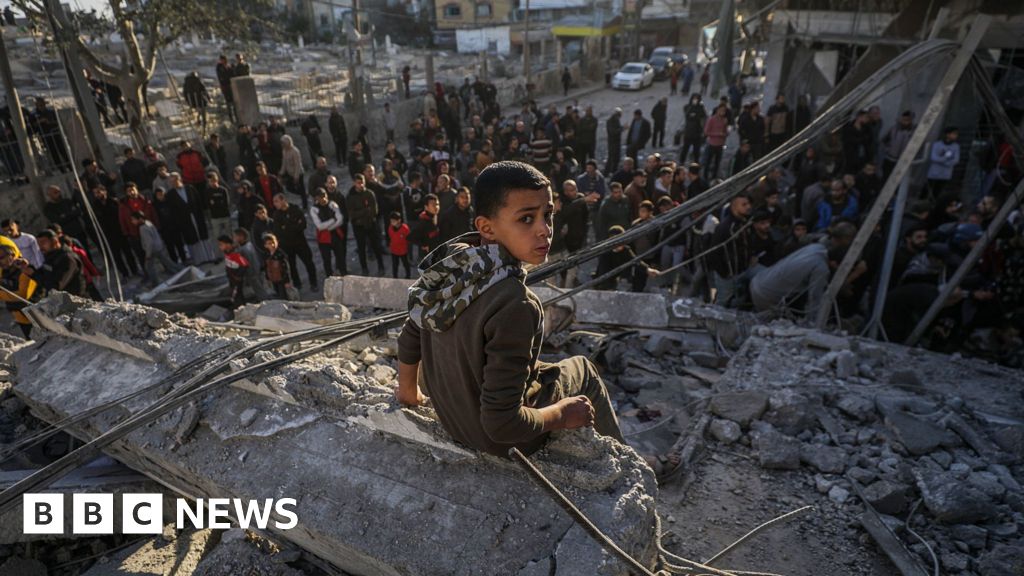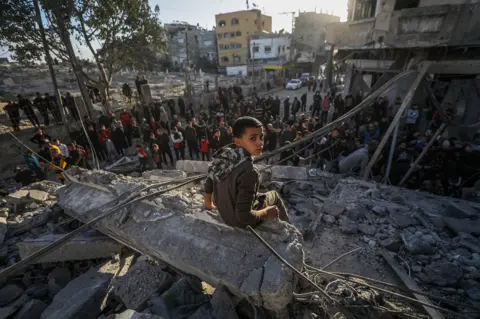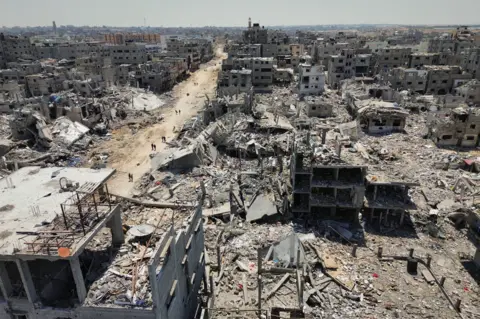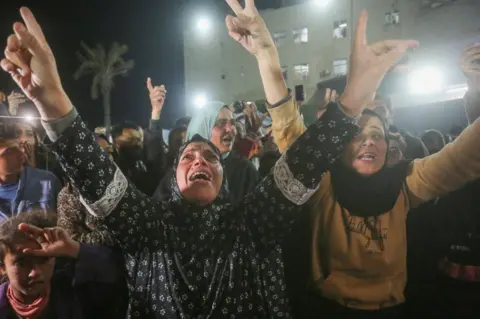Physical Address
304 North Cardinal St.
Dorchester Center, MA 02124
Physical Address
304 North Cardinal St.
Dorchester Center, MA 02124

 EPA
EPACivilians in Gaza anxiously awaited a pause on Friday after 15 months of merciless war as Israel’s cabinet met in Jerusalem to finalize a temporary ceasefire deal with Hamas.
As they waited, Israel launched airstrikes along the strip, killing at least 113 people since a deal in principle was agreed on Wednesday night, according to the Hamas-run Gaza Civil Defense Agency.
The deal, finalized on Friday afternoon, is due to take effect on Sunday, leaving just over 24 hours for Gazans to wait for respite.
“Time is running slower than ever,” said Dr. Abdullah Shabir, 27, an emergency physician at Baptist Hospital in Gaza City. “At any moment you can lose your life,” he said. “Sitting at home, walking down the street – no warning.”
Dr. Shabir was on shift at the hospital on Wednesday night when news of the ceasefire agreement broke. There was a brief moment of joy, he said, but less than an hour separated the announcement from the start of a wave of airstrikes that sent a stream of dead and wounded into Baptista.
Every employee was called. “It was as bad as we have ever seen,” said Dr. Shabir. “Severe injuries, severe burns. Of course, there are many dead.”
 EPA
EPAAmong the dead transported Thursday was a colleague, Khala Abu Ahmed, a 27-year-old internal medicine specialist who was described by two Baptist colleagues as a dedicated and promising young doctor and a good person.
She worked tirelessly and under extreme pressure for 15 months since the war began, said Dr. Ahmad Eliwah, head of the emergency department, and was killed after a ceasefire was agreed.
Among the millions of displaced people in the strip, many were waiting Friday for the moment when they would be able to return home for the first time since the war began. Many will find a bombed wasteland on the site of their home.
“My house is completely destroyed, there is no building,” said Sabrin Doshan, 45, who owned a street stall and lived in a residential neighborhood in Gaza City.
According to her, since the beginning of the war, Doshan has lost 17 members of her family. She was ready to leave Deir el-Balah in central Gaza, where she lived in a tent, to the ruins of her home.
“Even if I have to pitch my tent on top of the rubble, it’ll be fine because I’ll be home,” she said. “Nowhere can satisfy me now but home.”
The destruction of the Gaza Strip is immense. According to a recent analysis by the United Nations Satellite Center, as of December, 69% of all structures and 68% of roads had been destroyed or damaged. About 46,700 people died, according to the Hamas-run health ministry.
Israel set out to destroy Hamas in Gaza in October 2023 after the group attacked southern Israel, killing around 1,200 people and taking 251 hostages.
For Gazans, the joy of a long-awaited ceasefire has been tempered by the scale of death and destruction. “I swear to God, it’s a mixed feeling,” said Wael Muhammad, a freelance journalist who lives in a refugee camp in central Gaza.
“From one moment to another, from joy to pain,” he said. “I am happy that the flow of blood will stop, but we live in agony.”
 Getty Images
Getty ImagesAs of Friday afternoon, the cease-fire agreement was making its way through the Israeli political system for final approval. That clears the way for an initial group of three hostages to be released as early as Sunday in exchange for about 95 Palestinian prisoners.
But the exchange, which will take place over the next six weeks, is fraught with the possibility of collapse.
“The biggest challenge is whether the ceasefire will be successfully implemented,” said Juliet Tuma, director of communications for the UN refugee agency UNRWA.
“If this is the case, the task ahead of us remains very large. The vast majority of shelters are overcrowded. Many simply live in the open or in makeshift buildings. They lack basic needs such as warm clothes. I wouldn’t call these living conditions, they are not conditions suitable for a human being.”
In Gaza on Friday, some were focused on Sunday and whether they would get that reprieve without the deal collapsing.
“We are afraid of any change, any movement,” said Khalil Natil, 30, whose home in Jabalia, in the far north of the Gaza Strip, was destroyed at the start of the war.
“The news is coming,” Natil said from a shelter in central Gaza. “We are watching and waiting.”